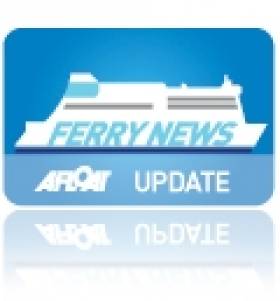Displaying items by tag: Irish Ferries Normandy
Rosslare Ferries Past and Present Profiles
#FERRY FOCUS – Two Rosslare Europort ferries, past and present are profiled in the latest issue of Ships Monthly. Normandy having served a near decade long career with Irish Ferries and Celtic Horizon as previously reported on Afloat.ie which has only been in service since late 2011 serving Celtic Link Ferries.
The former Normandy, a month ago today was beached at Alang, India to undergo scrapping, following failed plans by Singapore owners to convert her to an offshore accommodation vessel for the energy industry.
She had served several routes throughout Northern Europe since her completion in 1982 as Prinsessan Birgitta for her original owners Sessan Line, before becoming part of Stena Line and at one stage she became 'Sealink's flagship St.Nicholas.
Incidentally during Normandy's career until 2007, her younger sister launched as Kronprinsessan Victoria, now named Stena Europe, was by sheer coincidence sailing out of Rosslare and still remains on Stena Line's route serving Fishguard.
Normandy was the first of the Irish Ferries fleet to change flag, where the Irish tricolour was replaced under the Bahamas flag. This initially led to strike action by UK, French and Irish unions that led to a longer-running hostile dispute during 2005/2006 by Irish seafarers whose jobs were ultimately replaced through outsourcing of lower paid agency crews mostly from Eastern Europe.
Eventually the remaining Irish Ferries vessels, flagship Ulysses, cruiseferry Isle of Inishmore and fast-ferry Jonathan Swift also changed flags, but to Cyprus and with a change of port registry to Limassol.
As for Celtic Horizon she is on a charter contract to Celtic Link Ferries Rosslare-Cherbourg service, the 2006-built ro-pax having served Naples-Sicilian routes for Caronte & Tourist.
The introduction of Celtic Horizon brings increased space and higher standard passenger facilities compared to her predecessor Norman Voyager, which too was delivered from the same Italian shipbuilder Visentini near Venice.
At this time of the year CLF are the only operator providing Irish-French sailings until Irish Ferries re-launch cruiseferry Oscar Wilde sailings for their 2013 season starting in late February, initially to Cherbourg followed in May by additional high-season sailings to Roscoff.





























































